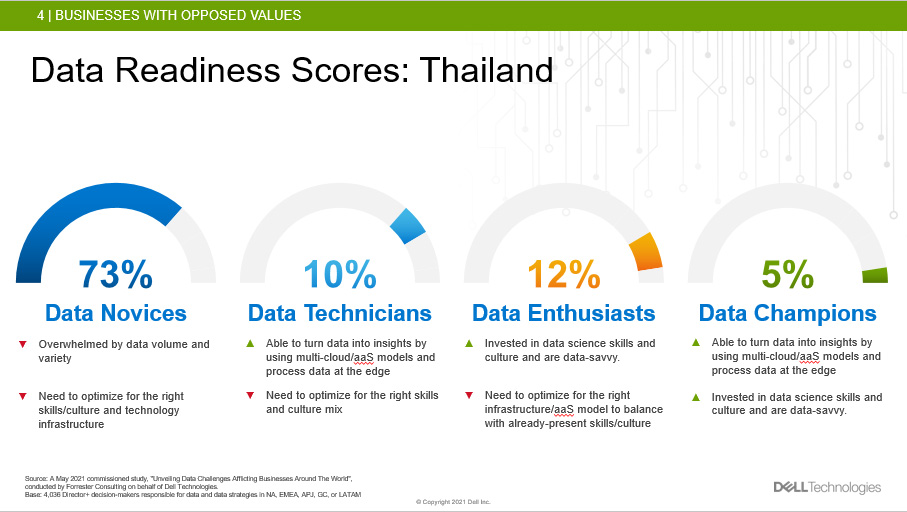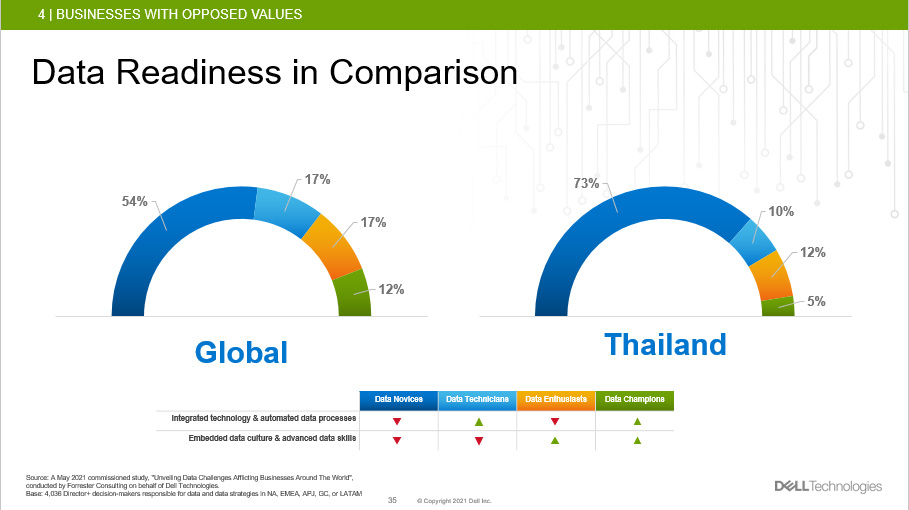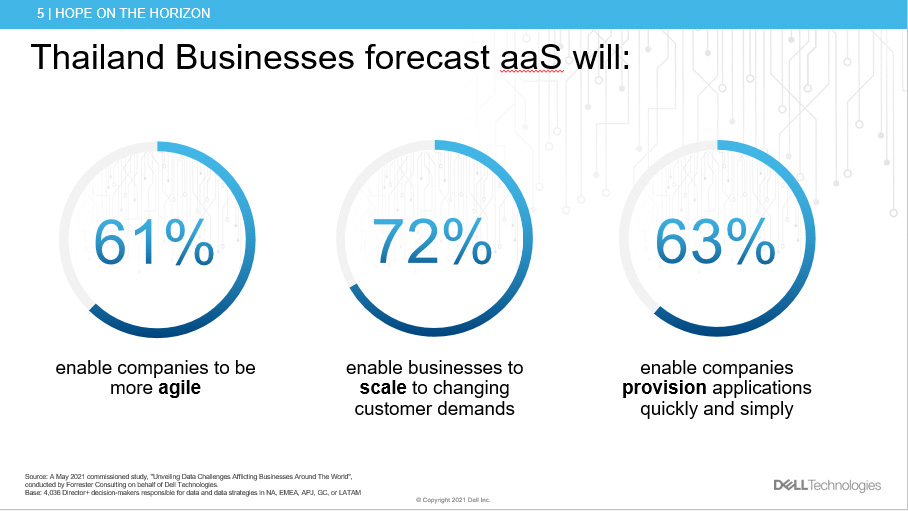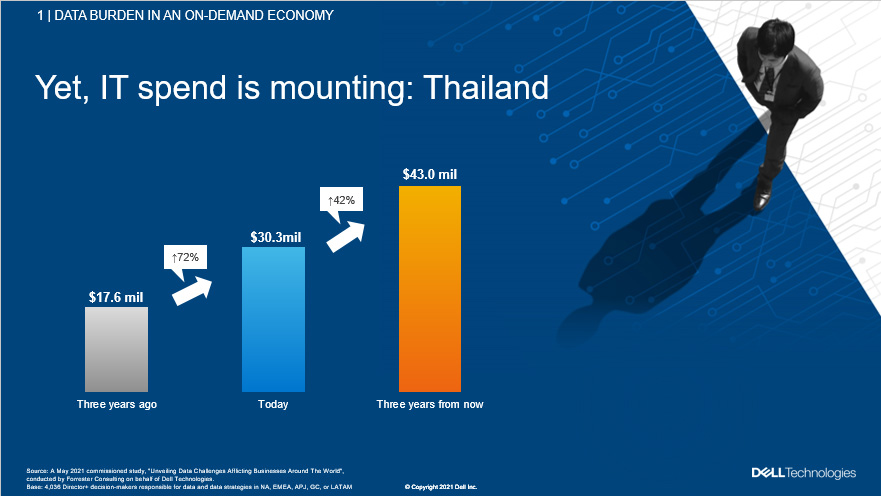Dell Technologies today released results of a global* study commissioned by Forrester Consulting, which shows that many businesses in Thailand are struggling with rapidly increasing data volumes. instead of creating a competitive advantage Data has become a burden due to many obstacles, including skills gaps, data silos, and processes. that must be operated by yourself (manual) business silo and data privacy, including vulnerabilities in data security
The “Data Paradox” or “Data Conflict” is the result of the overwhelming volume, speed, and diversity of data across business, technology, personnel and processes.

The results of the research emerged from a survey of more than 4,000 decision makers from 45 countries and build upon the results of the research. The Dell Technologies Digital Transformation Index, which assesses global business digital developments. The Digital Transformation Index reveals “Overload, inability to extract insights from it,” is the third-highest barrier to reform globally. Up from 11th place in 2016
1. Understanding the Conflict (Paradox)
Two-thirds of the respondents (66 percent) (Thailand: 67 percent) said their business was data-driven and said they “Data is an organization’s lifeblood,” but only 21 percent (Thailand: 12 percent) insist that data is handled as an asset and places a high priority on how it is used in their entire business. to clarify this conflict. The research therefore summarizes the objectives of the measurement of business organization’s data readiness.

The results showed that 88 percent of businesses (Thailand: 95 percent) are not advanced in both technology and information processes. and/or data culture and skills Only 12 percent of businesses (Thailand: 5 percent) are defined as Data Champions, which are companies that are actively engaged on both sides. (technology/process and culture/skills)
2. Conflict of “The demand is too great to handle.”
According to the research, 70 percent (Thailand: 73 percent) said they could collect data faster than they could be analyzed and used, but 67 percent (Thailand: 70 percent) said they needed more data than they could obtain. at present which may be a result of
- 64 percent (Thailand: 61 percent) protect large volumes of data within their own or controlled data centers. Even knowing the benefits of data processing at the edge (where the data is generated)
- Poor data leadership, with 70 percent (Thailand: 68 percent) admitting that their board or board has not clearly supported their data and analytics strategy.
- An IT strategy that doesn’t support scalability, with 49 percent (Thailand: 48 percent) accelerating more data lakes instead of merging existing ones.

The result is The rapid increase in data is making work life harder instead of easier, with 64 percent (Thailand: 65 percent) complaining about a large amount of data that fails to meet security and compliance requirements. and 61 percent (Thailand: 63 percent) said their team was already overwhelmed with large amounts of data.
“At a time when businesses are under immense pressure to embrace digital transformation. for faster and faster customer service Businesses need to take action to have more information. including to better dig up existing data especially at present With 44% of respondents in Thailand saying The virus outbreak has made it difficult to collect information. storage and analysis significantly increased.”
Noppadon Panyathipat, Managing Director, Thailand, Dell Technologies, said, “Being a data-driven business is a journey. And organizations need to be guided to help along the way.”

3. Conflict of “Seeing without doing anything”
Over the past 18 months, the on-demand business sector has grown and expanded. This creates a new wave of businesses where data is data-first and data is everywhere. (data-anywhere), however, the number of enterprises moving most of their applications and infrastructure to the model. or the as-a-Service model is still small (20 percent: Thailand: 12 percent), although
- 64 percent (Thailand: 72 percent) saw an opportunity to scale or scale up their services according to their changing needs.
- 63 percent (Thailand: 61 percent) believe this approach will help them become more agile.
- 60 percent (Thailand: 63 percent) predict that businesses It can make application provisioning simple and fast. (Just a finger touches the command button)
- The on-demand model will enable 83 percent (Thailand: 83 percent) of businesses battling one or all of the following obstacles to better store, analyze, and act on data. Both in terms of the high cost for storage to store data. Unoptimized data warehouse and outdated IT infrastructure and processes that require people to operate more than they can meet their own needs.

Although businesses will face problems today But many organizations have plans for a better future: 66% (Thailand: 65%) intend to use machine learning (ML) to automatically detect anomalies, while 57 percent (Thailand: 52) percent) are considering adjusting the format to use data-as-a-service and 52 percent (Thailand: 44 percent) are planning to take a deeper look at the performance group for restructuring how data is processed and used in the next one to three years. page
There are three ways businesses can turn their data burden into a data advantage.
- Modernize their IT infrastructure to support edge data, including bringing infrastructure and business applications closer to the data they need to store, analyze, and process while avoiding Generating huge amounts of diverse data by using a consistent multi-cloud operating model.
- Channel/Data Optimization This allows data to flow freely and securely while bringing AI/ML to enhance management.
- Developing software to provide a personal experience. and in an integrated way as the customer wants
* Research commissioned May 2021 titled “Unveiling Data Challenges Afflicting Businesses Around The World”, conducted by Forrester Consulting for Dell Technologies, interviewing executives and stakeholders. Have decision-making powers and have the authority to take care of information and a data strategy for 4,036 people from countries in North America, Europe, the Middle East and Africa. Asia Pacific and Japan Greater China and Latin America
The post Dell Technologies reveals new research Pointing out that businesses in Thailand must bear the burden of overflowing data appeared first on Thumbsup.



